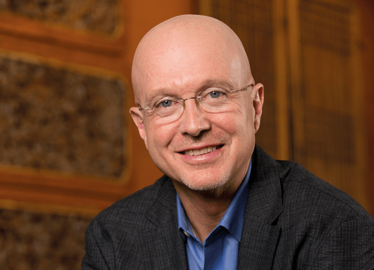Taking the Transformative PATH
Sitting Down With... Steve Davis, President and CEO of PATH, and lecturer, Social Innovation, at Stanford University, California, USA.
Tell us the story of your career…
My career has taken some interesting twists and turns but in my head they’ve all woven together. I started out as a Religion major at Princeton University, before doing an MA in Chinese Studies and then going to Law School. I’ve worked as a lecturer in China and the US, human rights lawyer in Geneva, and IP strategist for Bill Gates’ digital media company, Interactive Home Systems (later Corbis) – where I eventually became the sole CEO.
But I have always been passionate about social activism and innovation – sitting on a number of boards in the social sector and being part of several non-profits’ startup and growth. After leaving Corbis, I became director of social innovation at McKinsey.

How did you join PATH?
Before being recruited to run PATH, I had served on the organization’s board as a private sector leader and worked for a year running PATH’s India office at the request of the previous CEO – so it was a great fit.
I couldn’t imagine another organization that brings together so many of the different things I care about passionately. Figuring out how to push new approaches to deliver social change is something I love, and PATH is a leader in this. Plus, you get to work on a global scale. I’m driven by the fact that the work we do can potentially impact millions of lives for the better. It’s exciting to be a key partner in some of the global conversations about how to actually eradicate disease and prevent pandemics. I think there’s a new way to operate as an international non-governmental organization and we’re figuring out new business models that will allow us to be even more global in our approach. I see PATH becoming a 21st century innovation enterprise that crosses the social, private and public sectors.
What are the biggest challenges facing global health?
There are some problems that just outrage me. How is it that so many women are dying of cervical cancer when we already know how to prevent and treat it? The HPV vaccine will miss a couple of generations so we also need to focus on how to screen and treat as many women as possible.
There’s also an enormous – and growing – burden around non-clinical diseases. We’ve learned that diseases such as diabetes and stroke aren’t just problems for the affluent – there are reams of evidence showing that they disproportionately affect the poor in both developed and developing countries. Prevention is a major problem, but so is treatment: how can you work on hypertension programs in countries like Kenya, where more than half of people have never had their blood pressure taken? There are some interesting low-cost treatment models out there but they aren’t being deployed globally. This is a major problem for global health right now: we have the necessary tools to solve many global health problems, but we don’t know how to scale them up. This is one of the things I talk about at Stanford as lecturer on Social Innovation – and I think multisector partnerships will be key to figuring out solutions.
How do you approach facing challenges?
In the kind of work I’ve chosen to do – be it working on the bleeding edge of new technology or as a social and gay activist – it can often seem like the odds are insurmountable. I’ve faced a number of very different challenges over the years. But whether dealing with the deaths of friends as a result of the New York AIDS epidemic in the 1980s, the world changing overnight after the burst of the Dot Com Bubble, or adjusting to a new political climate (that is increasingly hostile to foreign aid and science), I always hope to have a strategy to fall back on. I believe that if you buckle down and make sure you’re thinking through the chess board very carefully, sound strategy can get you through most challenges.
I also strongly believe people are generally good and committed to progress. There are exceptions, of course, but I think it’s important to have this fundamental belief – be it in the form of religious faith or secular optimism. It seems to me that author and cognitive scientist Stephen Pinker’s theories are correct; we are making enormous progress. I always say follow the trend-lines, not the headlines.
What changes are needed in the pharma industry to benefit global health?
I think we need to see more multisector partnerships involving pharma and technology companies. I’d also like to see more personnel exchange between different sectors – working in industry is very different to working in the public sector or the non-profit sector and vice versa, and it’s important for each side to appreciate those differences. Of course, a big challenge for the pharma industry over the next decade will be working out a pricing model that isn’t detrimental to the poor or to industry. I believe that innovative financing mechanisms, such as priority review vouchers in the US, will become increasingly important in this regard.
Finally, there tends to be something of a trickle down model in the pharma and biotech industry, where poorer communities are an afterthought of the target population. I would love to see more companies working to develop therapies with vulnerable communities in mind from the very beginning.
Steve Davis is President and CEO of PATH and lecturer, Social Innovation, at Stanford University, California.



















